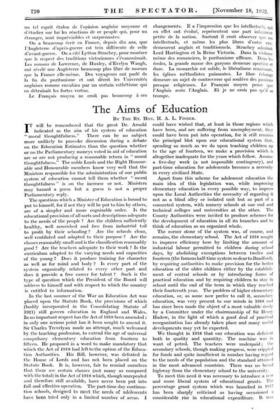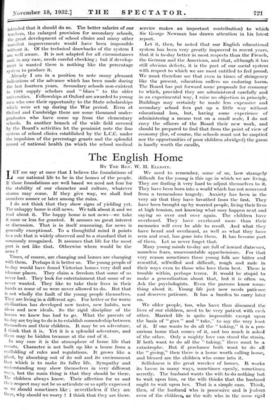The Aims of Education
BY THE RT. HON. H. A. L. FISHER.
IT will be remembered that the great Dr. Arnold indicated as the aim of his system of education "moral thoughtfulness." There can be no subject more unlikely to provoke discussion during a . debate on the Education Estimates than the question whether or no the Parliamentary moneys voted in aid of education are or are not producing a reasonable return in "moral thoughtfulness." The noble Lords and the Right Honour- able and Honourable members know very well that the Ministers responsible for the administration of our public system of education cannot tell them whether "moral thoughtfulness" is on the increase or not. Ministers may hazard a guess but a guess is not a proper Parliamentary reply.
The questions which a Minister of Education is bound to put to himself, for if not they will be put to him by others, are of a simpler and more cognizable order. Is the educational provision of all sorts and descriptions adequate to the needs of the people ? Are the children sufficiently healthy, well nourished and free from industrial toil to profit by their schooling ? Are the schools clean, well ventilated and adapted to their purpose ? Are the classes reasonably small and is the classification reasonably good ? Are the teachers adequate to their work ? Is the curriculum adapted to the varying needs and capacities of the young ? Does it produce training for character as well as for mind and body ? Is every part of the system organically related to every other part and does it provide a free career for talent ? Such is the type of question which the President of the Board will address to himself and with respect to which the country is entitled to information.
In the last summer of the War an Education Act was placed upon the Statute Book, the provisions of which (bodily incorporated in the Consolidating Statute of 1921) still govern education in England and Wales. In no important respect has the Act of 1918 been amended ; in only one serious point has it been sought to amend it. Sir Charles Trevelyan made an attempt, much welcomed by the teaching profession, to extend the age of universal compulsory elementary education from fourteen to fifteen. He proposed in a word to make mandatory that which the Act of 1918 had left to the option of the Educa- tion Authorities. His Bill, however, was defeated in the House of Lords and has not been placed on the Statute Book. It is, however, fair to remind ourselves that there arc certain clauses (not many as compared with the total) in the Act of 1918 which, though unrepealed and therefore still available, have never been put into full and effective operation. The part-time day continua- tion schools, designed to meet the needs of adolescents have been tried only in a limited number of areas. I could have wished that, at least in those regions which have been, and are suffering from unemployment, they could have been put into operation, for it still remains the principal blot upon our educational system that, spending so much as we do upon teaching children up to the age of fourteen, we make a provision which is altogether inadequate for the years which follow. Assume a five-day week (a not impossible contingency), and part-time education for adolescents becomes a necessity in every civilized State.
Apart from this scheme for adolescent education the main idea of this legislation was, while improving elementary education in every possible way, to impress upon the Local Authorities the necessity of regarding it not as a blind alley or isolated unit but as part of a connected system, with nursery schools at one end and technical colleges and universities at the other. The County Authorities were invited to produce schemes for the development of education in all its branches and to think of education as an organized whole.
The corner stone of the system was, of course, and remains, the elementary school. The Act of 1918 sought to improve efficiency here by limiting the amount of industrial labour permitted to children during school days, by abolishing exemptions between twelve and fourteen (the famous half-time system so dear toBradford), by requiring authorities to make provision for the better education of the older children either by the establish- ment of central schools or by introducing forms of practical education and by requiring children to stay ill school until the end of the term in which they reached their fourteenth year. The problem of higher elementary education, or, as some now prefer to call it, secondary education, was very present to our minds in 1918 and has since been made the object of a most valuable study by a Committee under the chairmanship of Sir Henry Hadow, in the light of which a good deal of practical reorganization has already taken place and many useful developments may yet be expected.
We thought in 1918 that our education was deficient both in quality and quantity. The machine was in want of petrol. The teachers were underpaid ; the secondary schools, though making progress, were crippled for funds and quite insufficient in number having regard to the needs of the population and the standard attained in the most advanced countries. There was no broad highway from the elementary school to the university.
To meet this need it was necessary to introduce a new and more liberal system of educational grants. The percentage grant system which was launched in 1917 has been sharply ' criticized as having occasioned considerable rise in educational expenditure. It was intended that it should do so. The better salaries of our teachers,. the enlarged. provision for secondary schools, the great development of school clinics and nrany other manifest improvements would have been impossible without it. Of the technical drawbacks of the system I am well aware. , It is not -adapted for all . circumstances and, in any case, needs careful checking ; but if develop- ment is wanted there is nothing like the percentage system to produce it. Already I am in a position to note many pleasant indications of the advance which has been made during the last fourteen years. Secondary schools non-existent in 1918 supply scholars and "blues" to the older universities. Fellowships at Oxford are awarded to young men who owe their opportunity to the State scholarships which were set up during the War period. Even at Oxford and Cambridge there are some thousand under- graduates who have come up from the elementary schools. In another branch of the wide field covered by the Board's activities let the pessimist note the fine system of school . clinics established by the L.C.C. under the impulsion of the Percentage grants and the splendid record of national- health (to which the school medical service makes. an important contribution), to which Sir George Newman has- drawn attentimi in his latest report.
Let it, then, be noted that our English educational system has been very greatly improved in recent years, that it is to-day better in most respects than the French, the German and the American, and that, although it has still obvious defects, it is the part of our social system with respect to which we are most entitled to feel proud: We must therefore see that even in times of stringency like the present, education suffers no enduring harm: The Board has put forward some proposals for economy to which, provided they are administered carefully and in an experimental way, I raise no objection in principle. Buildings may certainly be made less expensive and secondary school fees put up a little way without educational loss, but, having some experience of administering a means test on a small scale, I do not envy the officers of the Board their new: work, and should be prepared to find that from the point of view of economy (for, of course, the schools must not be emptied nor the opportunities of poor children abridged) the game is hardly worth the candle,

































































 Previous page
Previous page